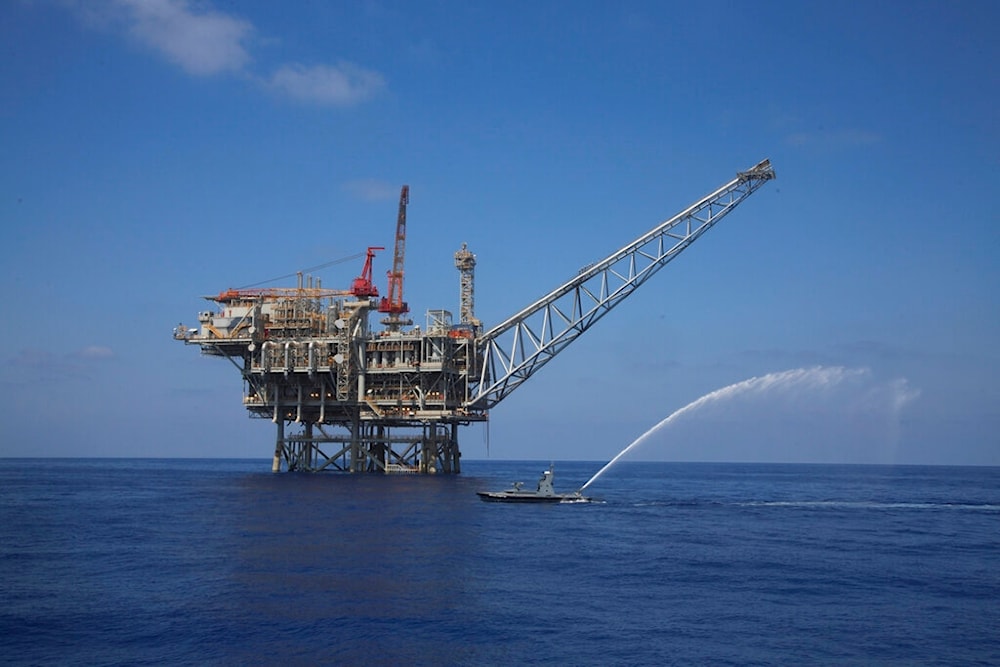After Tamar gas field decommissioning, Leviathan field could be next
As the northern front heats up, the Leviathan field could also be decommissioned after Tamar.
-

In this Sept. 2, 2015 file photo, a rig is seen in the Tamar natural gas field in the Mediterranean Sea, off the coast of occupied Palestine (AP)
Israeli media confirmed, on Thursday, that the Tamar gas field, located 80 km away from the occupied coast of Haifa in occupied Palestine, has been shut down since the launch of Operation Al-Aqsa Flood.
The Israeli website, Calcalist, underscored that "the billions spent by the state ("Israel") on defense do not provide the goods, and a flare-up in the northern arena could also disable Leviathan." This comes after the report revealed that over 3 billion Shekels were spent, but the Resistance's operation proved they were "not sufficient" at best.
The website also referenced a report that cited that the closure of the Tamar rig "leads to a loss of about NIS 800 million per month." That being said, early next week, "Israel" would have lost its first 800 million since the beginning of the Resistance's Operation, which began on October 7 and remains ongoing today on its 27th day.
In this context, the former Egyptian Foreign Minister, Nabil Fahmy, pointed out, back on October 25, that "the conflict had affected the gas market," as the amount of gas exported from Israeli sources to Egypt to be refined to liquefied natural gas before being sent to Europe actually decreased. On that topic, the Calcalist's report underscored that "gas exports to Egypt dropped by about 70% during the war."
Middle East situation could push oil to $157 a barrel: World Bank
The World Bank warned, on Monday, that an escalation of the current war in Gaza may boost global oil prices as high as $157 per barrel in extensive interruption.
In its Commodity Markets Outlook, the World Bank warned that "in a 'large disruption' scenario—comparable to the Arab oil embargo in 1973— the global oil supply would shrink by 6 million to 8 million barrels per day. That would drive prices up by 56% to 75% initially—to between $140 and $157 a barrel."
Global oil prices could rise to between $93 and $102 per barrel in a "small disruption" scenario and between $109 and $121 in a "medium disruption" scenario.
Despite the fact that the world economy is currently doing better than it did in the 1970s, the World Bank issued a warning that the conflicts in the Middle East and Ukraine may force the world's commodity markets into uncharted territory.
Additionally, the World Bank stated that rising oil costs would have a detrimental impact on food prices.
The world witnessed oil prices skyrocket following the launch of Operation Al-Aqsa Flood, with benchmark oil contracts of Brent and WTI soaring over 5% in Asian deals before gradually easing back.
Global equity markets have been experiencing a shake ever since the launch, even though energy firms were given a push by higher oil prices, which in turn gave them higher profits.
Currencies like the dollar, yen, and Swiss franc, in addition to gold, have seen support while benefiting from their status as a haven investment during severe geopolitical turmoil.
The current events in the region have triggered fear with regard to inflation and spiked prices with central banks trying to soothe interest rate hikes to avoid recessions.
Read more: Israeli bombs dropped on Gaza equivalent to 2 Hiroshima nuclear bombs

 3 Min Read
3 Min Read








